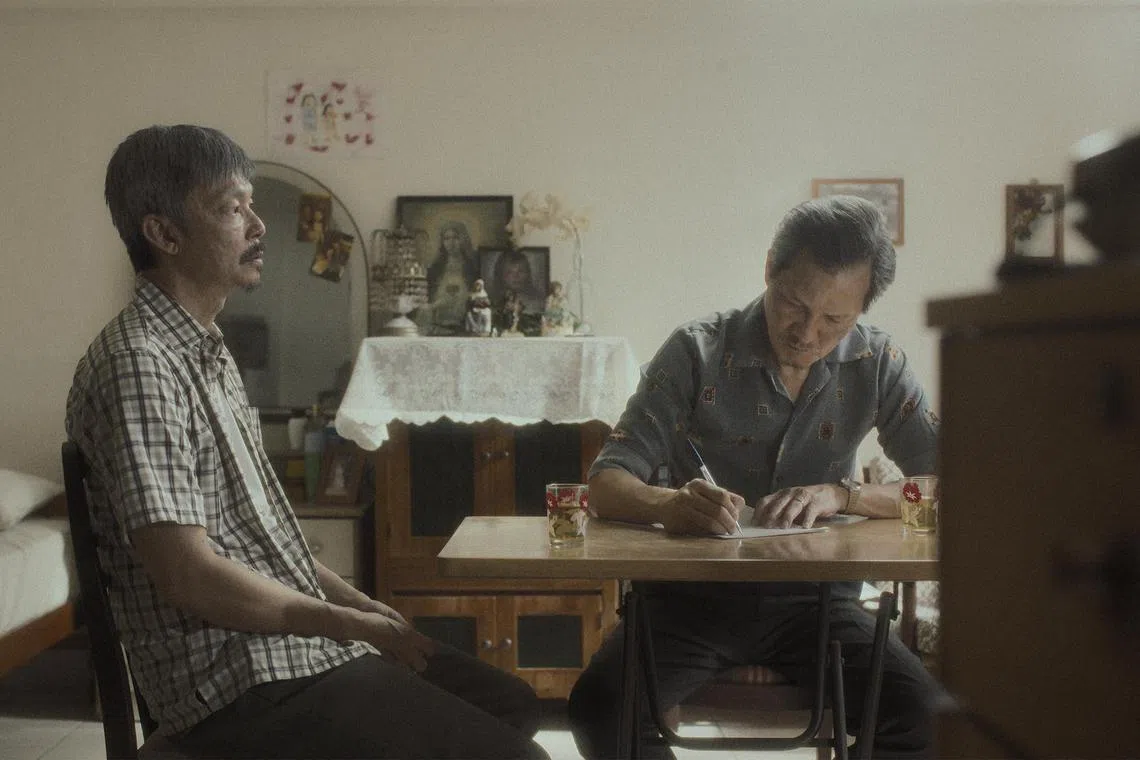At The Movies: Wonderland offers heart and Hokkien
Sign up now: Get ST's newsletters delivered to your inbox

Mark Lee (left) and Peter Yu in Wonderland, a film which takes a deep dive into the inner lives of its characters.
PHOTO: GOLDEN VILLAGE
Follow topic:
Wonderland (PG13)
125 minutes, opens on Aug 8
4 stars
The story: It is the 1980s and incense shop owner and single parent Loke (Mark Lee) sells his kampung home to pay for his daughter Eileen’s (Xenia Tan) education in New York. After moving into a small flat, he finds himself lonely and isolated, haunted by memories of his late wife and the good times they shared at the Wonderland Amusement Park in Kallang. The illiterate Hokkien-speaking man seeks the help of his neighbour Tan (Peter Yu), a church choir director, so he can correspond with Eileen. Together, the men must come to terms with the secrets they hold about themselves and their families.
This is a rare Singapore film that is specific in its references to local culture and history, but which also takes a deep dive into the inner lives of its characters.
The slower pacing, frequent use of flashbacks and character-driven behaviour give the production all the hallmarks of a festival film, but director Chai Yee Wei, working on a screenplay from Michelle Chang, Chance Wanlass and Situ Bi, never lets the material become too ambiguous or internalised.
Character motivations are clear and easy to follow. This material is middlebrow, in the best sense of the word.
There is plenty of sentiment on display here, so much so that this drama might be called a tearjerker.
Chai’s use of music to underscore the emotional beats is not subtle and neither is the story’s emphasis on wholesome family values. There are moments when sentimentality dominates, but those moments are, thankfully, brief.
Yu’s Tan, for example, is offered a measure of redemption, one that will give his story a typically pleasant conclusion. Instead, the film offers him an open-ended journey.
The story gets its suspenseful drive from a web of cross-linked loyalties, one that causes Loke, Tan and others to choose between the comfortable lie or the heartbreaking truth.
The lies prevail, leading to serio-comic consequences as characters tie themselves into knots keeping the hoax alive. To the film’s credit, the matters about which they dare not speak out loud feel not like plot contrivances, but come across as organic to the context.
Much has been said about how almost every line of dialogue here is in Hokkien, a rarity in Singapore’s dialect-averse entertainment scene. As uttered by Lee and Yu, the language sounds gentle and musical. It is a novelty for only a few minutes before one forgets about it to focus on the story.
The English subtitles are also commendable – the translations strive to be as pithy as the Hokkien, rather than aiming to be fastidiously accurate.
If there is a flat note to be found here, it is in the attempt to surround Loke and Tan with community, namely the group that hangs out in the void deck. The inclusion of community care messages for flat-dwellers living alone could have been handled in a less obvious way.
That said, without the reactions of the void deck group, the impact of the truths that emerge in the final act would have been greatly lessened.
Lee has shown he is versatile enough to work in mass-appeal films (Money No Enough 3, 2024; The King Of Musang King, 2023) and in awards-attracting festival-leaning work (Number 1, 2020).
In Wonderland, he once again proves he can dig deep to deliver the sensitivity and vulnerability needed to make the story work.
Hot take: Singapore has lacked local films that hit strong emotional notes without descending into sentimentality, and in Wonderland, that magical middle ground has been achieved.


